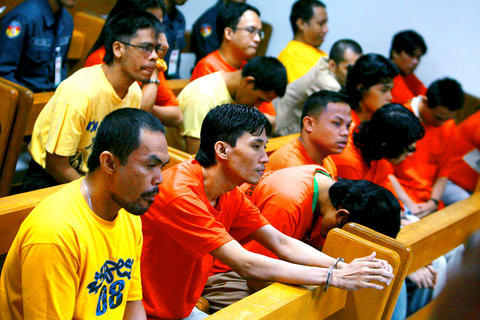A Philippine court convicted 14 Muslim militants yesterday of abducting a US missionary couple and 18 others in a 2001 kidnapping spree that left two Americans dead and prompted Washington to start training Philippine troops.
Most of the top leaders of the al-Qaeda-linked Abu Sayyaf group, which orchestrated the abductions at the resort island of Palawan, have been killed in clashes since the trial opened in 2003. Philippine officials have credited the US counterterrorism training that started in 2002 for many of the battlefield successes.
Out of 85 suspects originally charged with kidnapping, 23 were captured and tried, and 18 appeared in court.

PHOTO: EPA
Fourteen were sentenced yesterday to life in prison and ordered to pay damages to the victims. Four were acquitted. Four others were killed in a botched prison break in 2005, and one has been cleared of charges.
"We commend the justice system for showing the rule of law," said Robert Courtney, the US Justice Department's attache at the Manila embassy.
He said he would relay the decision to Gracia Burnham, who was wounded and her husband killed during their rescue at the end of the yearlong ordeal.
"It's important to try to compensate victims, but how can she ever be made to feel whole after the trauma that she went through," Courtney said.
Former Filipino hostage Angelica Montealegre praised the convictions, but said some guerrillas still remain at large.
"We are not sure of our safety. [But] they deserve this," she said.
Toting Hannoh, who was found guilty, struck a defiant note. Asked if this was the end of the Abu Sayyaf, he said: "No, it will become stronger."
Among those acquitted was the only woman in the group, Satra Tilao, the disabled sister of rebel leader Abu Sabaya, who was killed by troops after the abductions.
"I'm so happy. Thanks to Allah! I'm taking my daughter home," said her mother, Isnaria Kuranding. "She was never a terrorist. How can she be, she's a cripple."
Gracia and Martin Burnham, missionaries for the Florida-based New Tribes Mission, were celebrating their 18th wedding anniversary when they were snatched by the Abu Sayyaf at the upscale Dos Palmas resort in Palawan on May 27, 2001, and taken by speedboat to southern Basilan island.
Fellow American Guillermo Sobero and 17 Filipinos were also kidnapped. Sobero, from Corona, California, was among several hostages beheaded by the rebels.
Martin Burnham and a Filipino nurse were killed during the military rescue raid on June 7, 2002.
The other hostages were released or managed to escape.
Burnham, who is from Wichita, Kansas, returned to the Philippines in 2004 to testify against her abductors.
She told the court she learned from Abu Sabaya that the rebels received a ransom from an unknown source, but that the guerrillas still refused to free her and her husband.
Burnham recounted her ordeal in a book, In the Presence of My Enemies, which aroused controversy in the Philippines because of her allegations that an unnamed Philippine general tried to get half of a possible ransom for the hostages and that soldiers delivered food and sold weapons to the guerrillas

The Burmese junta has said that detained former leader Aung San Suu Kyi is “in good health,” a day after her son said he has received little information about the 80-year-old’s condition and fears she could die without him knowing. In an interview in Tokyo earlier this week, Kim Aris said he had not heard from his mother in years and believes she is being held incommunicado in the capital, Naypyidaw. Aung San Suu Kyi, a Nobel Peace Prize laureate, was detained after a 2021 military coup that ousted her elected civilian government and sparked a civil war. She is serving a

China yesterday held a low-key memorial ceremony for the 1937 Nanjing Massacre, with Chinese President Xi Jinping (習近平) not attending, despite a diplomatic crisis between Beijing and Tokyo over Taiwan. Beijing has raged at Tokyo since Japanese Prime Minister Sanae Takaichi last month said that a hypothetical Chinese attack on Taiwan could trigger a military response from Japan. China and Japan have long sparred over their painful history. China consistently reminds its people of the 1937 Nanjing Massacre, in which it says Japanese troops killed 300,000 people in what was then its capital. A post-World War II Allied tribunal put the death toll

‘NO AMNESTY’: Tens of thousands of people joined the rally against a bill that would slash the former president’s prison term; President Lula has said he would veto the bill Tens of thousands of Brazilians on Sunday demonstrated against a bill that advanced in Congress this week that would reduce the time former president Jair Bolsonaro spends behind bars following his sentence of more than 27 years for attempting a coup. Protests took place in the capital, Brasilia, and in other major cities across the nation, including Sao Paulo, Florianopolis, Salvador and Recife. On Copacabana’s boardwalk in Rio de Janeiro, crowds composed of left-wing voters chanted “No amnesty” and “Out with Hugo Motta,” a reference to the speaker of the lower house, which approved the bill on Wednesday last week. It is

FALLEN: The nine soldiers who were killed while carrying out combat and engineering tasks in Russia were given the title of Hero of the Democratic People’s Republic of Korea North Korean leader Kim Jong-un attended a welcoming ceremony for an army engineering unit that had returned home after carrying out duties in Russia, North Korean state media KCNA reported on Saturday. In a speech carried by KCNA, Kim praised officers and soldiers of the 528th Regiment of Engineers of the Korean People’s Army (KPA) for “heroic” conduct and “mass heroism” in fulfilling orders issued by the ruling Workers’ Party of Korea during a 120-day overseas deployment. Video footage released by North Korea showed uniformed soldiers disembarking from an aircraft, Kim hugging a soldier seated in a wheelchair, and soldiers and officials